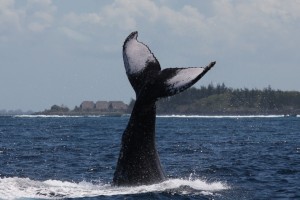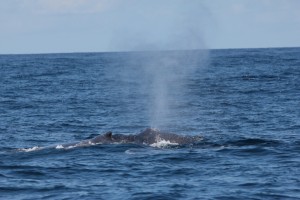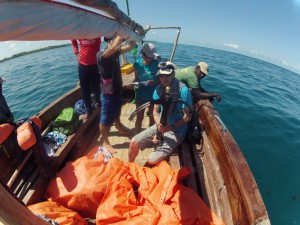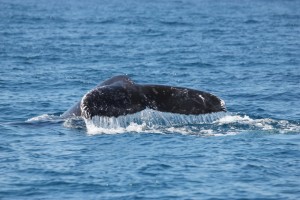Blog 6: First whales of the season! 15/07/2012
Early Sunday morning was a very exciting day for the Zanzibar Humpback Whale Research Project team. A local fisher called us reporting two whales in the area outside Makunduchi off the southeast coast of Zanzibar. We eagerly got our equipment together, jumped into our boat and headed in the direction given by the fisher. We were hopeful to find the whales although it takes about an hour to reach Makunduchi from Kizimkazi-Dimbani. And they were! Kristin was the first to spot a blow about 1500m ahead of us. The team sprang into action, with spotters at the bow and behaviour recorders at the stern, all barely able to contain their excitement at finally seeing the first whales of the season! The whales turned out to be a mother, her calf and an escort whale travelling slowly along the south east corner of the island with beautiful tail dives providing excellent opportunities for photo ID. After an hour the whales started travelling faster and were soon too far away so we left them alone to survey for other whales.
 It was during our lunch break that Kyla suddenly shouted ‘Whale!!’ She had spotted a breaching whale 2500m, directly ahead of us. Lunch was quickly packed up and replaced by cameras and other equipment. There were two adult whales and a juvenile which were socializing and resting. We followed them until we had collected enough data and then decided to leave them alone. The wind was picking up and we decided to head home, very happy with our two first whale sightings.
It was during our lunch break that Kyla suddenly shouted ‘Whale!!’ She had spotted a breaching whale 2500m, directly ahead of us. Lunch was quickly packed up and replaced by cameras and other equipment. There were two adult whales and a juvenile which were socializing and resting. We followed them until we had collected enough data and then decided to leave them alone. The wind was picking up and we decided to head home, very happy with our two first whale sightings.
 On the way back we decided to do some target practise with the crossbow with an old life jacket, with the intention of collecting future small biopsy samples from the whales. Skin and blubber samples will be used for genetic studies to investigate how the whales off Zanzibar are related to those found in other areas off Africa and elsewhere around the world.
On the way back we decided to do some target practise with the crossbow with an old life jacket, with the intention of collecting future small biopsy samples from the whales. Skin and blubber samples will be used for genetic studies to investigate how the whales off Zanzibar are related to those found in other areas off Africa and elsewhere around the world.
 Back at the house, we discussed the day’s activities over dinner. After months of preparation we had successfully conducted our first whale survey. It gave our new students Yussuf, Nat and Lynne a great opportunity to practise the data collection and to see what happens when we encounter a whale. We all went to bed happy and excited at the prospect of seeing more whales in the morning.
Back at the house, we discussed the day’s activities over dinner. After months of preparation we had successfully conducted our first whale survey. It gave our new students Yussuf, Nat and Lynne a great opportunity to practise the data collection and to see what happens when we encounter a whale. We all went to bed happy and excited at the prospect of seeing more whales in the morning.

